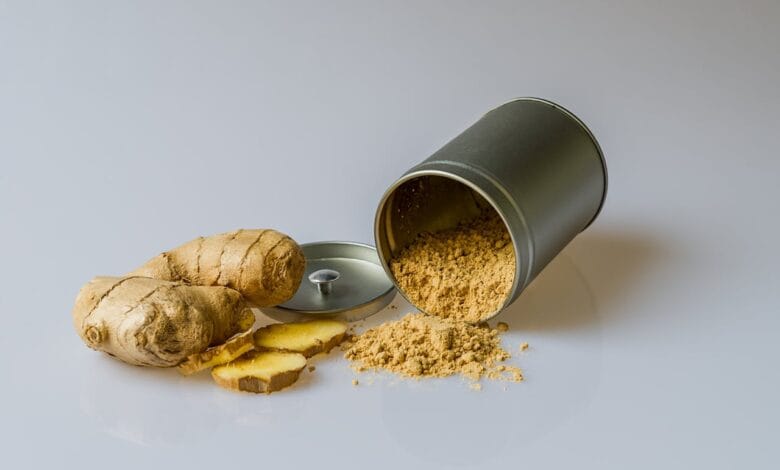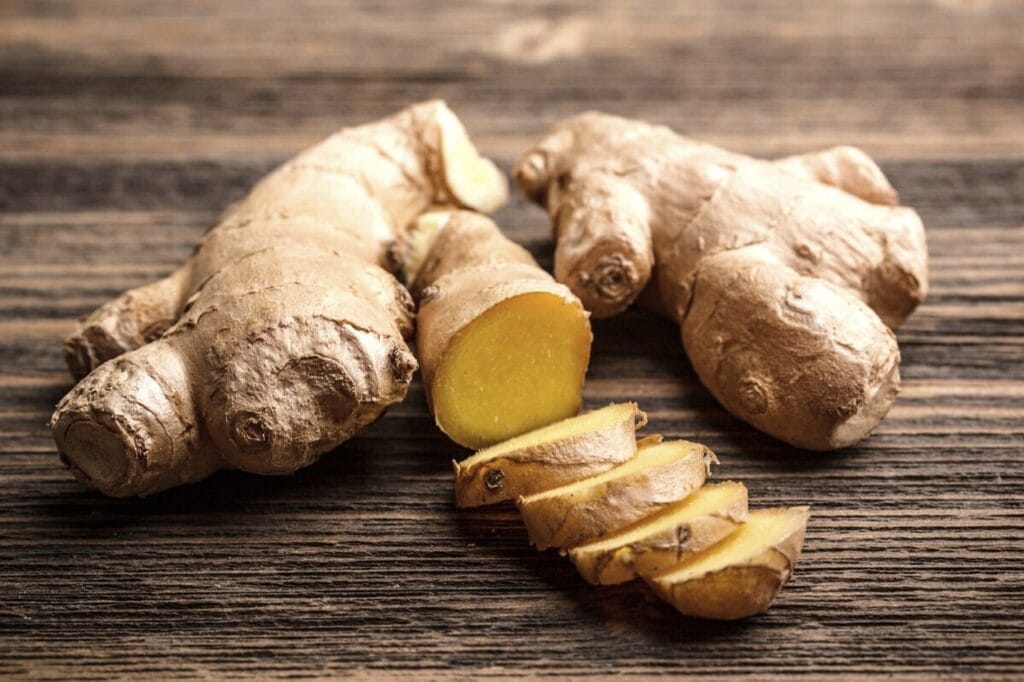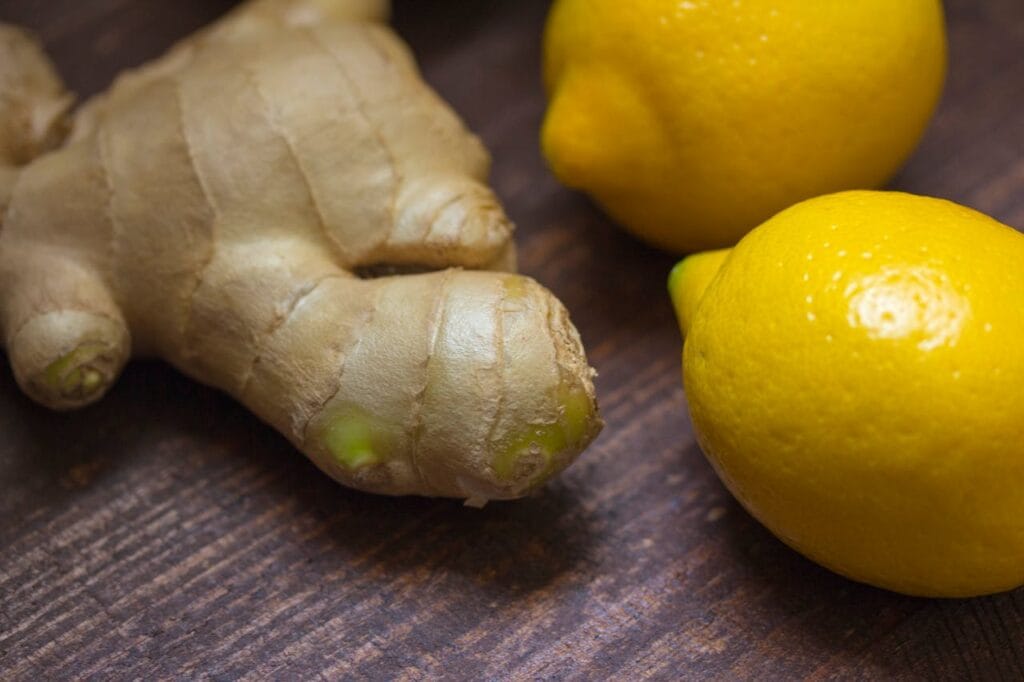Ginger: The Amazing Herb with Numerous Health Benefits
Everything you need to know about ginger

Ginger, the remarkable plant that has been used for thousands of years in medicine and cooking, has recently gained widespread popularity due to its numerous health benefits. Known for its pungent taste and strong aroma, ginger is used in many dishes and beverages worldwide. In this article, we will explore the health benefits of ginger, how to prepare and use it, and some tips for safe consumption.
Origin of the Ginger Herb
Ginger is a perennial herbaceous plant belonging to the Zingiberaceae family, with aromatic tuberous roots that have a spicy flavor. It is believed that ginger originated in Southeast Asia, particularly in the regions of India and China.
Current Ginger Cultivation Areas
Some of the main areas where ginger is currently cultivated include:
- India
- China
- Indonesia
- Nigeria
- Jamaica
Ginger is rich in vitamins and minerals, such as potassium, manganese, and magnesium. It is also believed to have anti-inflammatory and antioxidant properties.

Types of Ginger Herb
Although there is only one type of ginger plant (Zingiber officinale), there are several types of ginger that differ in their characteristics, taste, and appearance. The most popular types include:
- Green Ginger: Fresh ginger that has not been dried or processed, characterized by its thin skin, light green color, and sharp taste.
- Dried Ginger: Obtained by drying green ginger, it has a light brown color and a spicy taste.
- Ground Ginger: Dried ginger that is ground into powder, characterized by its dark brown color and very spicy taste.
- Black Ginger: Green ginger that is peeled and dried in the sun to produce black ginger, known for its black color and very spicy taste.
- White Ginger: Green ginger that is peeled and soaked in a solution of sulfates to obtain white ginger, characterized by its white color and sweet taste.
Different types of ginger contain varying amounts of essential oils, which affects their flavor and potency. Various types of ginger are used in different dishes depending on their characteristics and taste.
ginger benefits
Ginger is known for its numerous health benefits, which are supported by scientific studies. Here are the key health benefits of ginger:
- Improving Digestion:
- Eases nausea and vomiting, especially morning sickness in pregnant women and post-chemotherapy nausea.
- Helps improve digestion and reduce bloating and gas.
- Stimulates the secretion of bile, aiding in fat digestion.
- Relieving Pain and Inflammation:
- Alleviates muscle and joint pain, particularly joint pain caused by rheumatoid arthritis.
- Treats migraines.
- Eases menstrual pain.
- Boosting Immunity:
- Enhances the immune system and reduces the risk of infection.
- Helps fight bacteria and viruses.
- Prevents symptoms of colds and flu.
- Lowering Cholesterol and Triglyceride Levels:
- Helps lower bad cholesterol (LDL) and raise good cholesterol (HDL).
- Reduces triglyceride levels in the blood.
- Improving Cardiovascular Health:
- Reduces the risk of blood clot formation.
- Improves blood flow and lowers blood pressure.
- Enhancing Brain Health:
- Improves memory and concentration.
- Reduces the risk of Alzheimer’s disease.
- Other Benefits of Ginger:
- Helps treat stomach ulcers.
- Alleviates symptoms of type 2 diabetes.
- Aids in weight loss.
ginger and lemon tea

Ginger and lemon are a natural combination that offers numerous health benefits. When consumed together, they can enhance overall health in several ways:
- Boosting the Immune System: Ginger contains antioxidants that fight free radicals, while lemon is rich in vitamin C, which strengthens the immune system and helps prevent illnesses.
- Improving Digestion: Ginger is known for its ability to improve digestion and relieve nausea, while lemon can stimulate the secretion of digestive juices and help reduce bloating.
- Fighting Inflammation: Ginger has anti-inflammatory properties that help reduce inflammation in the body, which can be beneficial for those suffering from arthritis.
- Improving Heart Health: Ginger can improve blood circulation and reduce bad cholesterol levels, while lemon contributes to lowering blood pressure due to its potassium content.
- Detoxification: This combination helps cleanse the body of toxins, with lemon acting as a diuretic to help eliminate waste, and ginger enhancing metabolism.
- Combating Infections: Both ginger and lemon have antibacterial and antiviral properties, which can help fight infections like colds.
- Weight Loss: Drinking ginger and lemon water may help boost metabolism and increase fat burning, contributing to natural weight loss.
- Improving Skin Health: Lemon is rich in vitamin C, which enhances collagen production and improves skin appearance, while ginger helps fight acne due to its anti-inflammatory properties.
Regular use of the ginger and lemon combination can be a valuable addition to your diet for maintaining good health and improving overall well-being.
ginger benefits for men
Ginger has numerous health benefits, and it is believed to have specific benefits for men’s health. Some potential benefits include:
- Improving Sexual Performance: Ginger may help improve blood circulation and increase blood flow, which can enhance sexual performance in men. It is also believed to have a positive effect on libido.
- Increasing Testosterone Levels: Some studies suggest that ginger may help increase testosterone levels, the main hormone associated with sexual ability and overall health in men.
- Improving Sperm Quality: Ginger may help improve sperm quality by increasing their motility and count, which can be beneficial for men experiencing fertility issues.
- Reducing Muscle Pain: Ginger has anti-inflammatory properties that help reduce muscle pain after exercise, which can be beneficial for men who engage in regular physical activity.
- Improving Heart Health: Ginger can help reduce bad cholesterol levels and triglycerides, contributing to better heart and vascular health, which is especially important for men as they age.
- Improving Digestion: Ginger is known for its ability to improve digestion and reduce gas and bloating, contributing to a sense of comfort after meals.
- Reducing Stress and Anxiety: Ginger can help reduce stress and anxiety, contributing to improved mood and overall mental health.
Incorporating ginger into your daily diet may offer multiple health benefits that improve the quality of life for men.
ginger benefits for women
Ginger has many health benefits that can be particularly beneficial for women. Here are some key benefits:
- Relieving Menstrual Pain: Ginger is known for its ability to relieve pain and inflammation, and it can be effective in reducing cramps and menstrual pain. Some studies suggest that taking ginger at the start of menstruation can have a similar effect to pain relievers.
- Reducing Pregnancy Nausea: Ginger is a popular natural remedy for morning sickness that many women experience during pregnancy. It is advised to consume moderate amounts of ginger to alleviate these symptoms, but it is important to consult a doctor before using it during pregnancy.
- Improving Skin Health: Due to its antioxidant and anti-inflammatory properties, ginger can help improve skin health and reduce acne and skin blemishes. It is also believed to contribute to better skin elasticity and combat signs of aging.
- Enhancing Hair Health: Ginger can promote hair growth and strengthen hair follicles thanks to its content of essential vitamins and minerals for scalp health. It can also help fight dandruff due to its antimicrobial properties.
- Supporting Digestion: Ginger is known for its digestive benefits, helping to reduce bloating and gas, and improving bowel movements, which contributes to comfort after eating.
- Boosting Immunity: Ginger contains antioxidants that help strengthen the immune system and protect the body from illnesses. This can be especially important for women during periods of stress.
- Improving Circulation: Ginger helps improve blood flow, which can be beneficial for women who suffer from cold extremities or circulation problems.
- Weight Control: Ginger can help increase metabolism, contributing to faster calorie burning and assisting in weight control.
ginger for pregnant women
Ginger can be beneficial for pregnant women, but it should be used cautiously and in moderation. Here are some benefits and notes on using ginger during pregnancy:
Benefits of Ginger for Pregnant Women
- Relieving Morning Sickness: Ginger is a well-known natural remedy for relieving morning sickness, a common symptom during the first trimester of pregnancy. It helps soothe the stomach and reduce nausea.
- Improving Digestion: Ginger can aid in digestion and prevent constipation, a common issue during pregnancy due to hormonal changes.
- Boosting Immunity: Ginger contains antioxidants and anti-inflammatory properties that can help strengthen the immune system during pregnancy.
- Relieving Pain and Inflammation: Thanks to its anti-inflammatory properties, ginger can help relieve some of the aches and pains that may occur during pregnancy.
Warnings for Using Ginger During Pregnancy:
- Proper Dosage: It is recommended not to exceed 1 gram of dried ginger per day (or its equivalent in fresh ginger) because large doses can be harmful. Ginger can be consumed as tea or added to food.
- Consult a Doctor: It is essential to consult a doctor before using ginger during pregnancy, especially if you have any specific health issues or are taking medication.
- Caution in the Third Trimester: Some studies suggest that consuming large amounts of ginger in the third trimester of pregnancy may affect blood clotting, so it is advisable to avoid or reduce its use during this period.
Notes:
- Ginger can be beneficial for alleviating some of the unpleasant symptoms during pregnancy, but it should be used cautiously and in moderation, with a doctor’s
ginger benefits sexually
Ginger, a popular spice with a long history in traditional medicine, is not only known for its health benefits but also for its potential to enhance sexual health. Here’s how ginger may benefit sexual health:
1. Improves Circulation:
- Ginger is known to improve blood flow and circulation, which is essential for sexual arousal. Better circulation can lead to stronger and longer-lasting erections in men and enhanced sensitivity in women.
2. Boosts Libido:
- Ginger has been traditionally used as an aphrodisiac. It may increase libido by stimulating the nervous system and enhancing blood flow, which can heighten sexual desire in both men and women.
3. Increases Testosterone Levels:
- Some studies suggest that ginger can increase testosterone levels in men, which is crucial for sexual function and overall vitality. Higher testosterone levels can improve sexual performance and energy levels.
4. Enhances Sexual Stamina:
- Regular consumption of ginger may help in boosting energy levels and reducing fatigue, which can contribute to better sexual stamina and performance.
5. Improves Fertility:
- Ginger is believed to improve sperm quality and count, which is beneficial for male fertility. It may also enhance sperm motility, increasing the chances of successful conception.
6. Reduces Sexual Anxiety:
- The stress-relieving properties of ginger can help in reducing anxiety, which is often a barrier to a healthy sex life. By calming the mind and improving mood, ginger can contribute to a more relaxed and enjoyable sexual experience.
7. Balances Hormones:
- Ginger may help balance hormones, which is essential for maintaining a healthy sex drive in both men and women. This balance can prevent hormonal imbalances that might otherwise lower libido.
8. Anti-Inflammatory and Antioxidant Effects:
- The anti-inflammatory and antioxidant properties of ginger can help reduce oxidative stress and inflammation, which are often linked to sexual dysfunction. These benefits contribute to overall reproductive health.
How to Use Ginger for Sexual Health:
- Ginger Tea: Drinking ginger tea regularly can help improve circulation and boost libido.
- Ginger and Honey: Mixing ginger with honey can create a natural aphrodisiac that enhances sexual desire.
- Ginger Supplements: Taking ginger supplements may provide a concentrated dose of its active compounds, potentially enhancing sexual health.
- Ginger in Diet: Incorporating ginger into your daily meals, such as in smoothies, salads, or main dishes, can support overall sexual well-being.
Precautions:
While ginger is generally safe for most people, consuming it in excessive amounts can lead to side effects like heartburn or digestive issues. It’s important to use ginger in moderation and consult with a healthcare provider, especially if you have underlying health conditions or are on medication.
black ginger benefits
Black ginger (Kaempferia parviflora) is a plant native to Southeast Asia, particularly Thailand, and has been used in traditional medicine for centuries. It’s known for its potential health benefits, especially in the areas of energy, athletic performance, and sexual health. Here are some of the key benefits of black ginger:
1. Enhances Sexual Health:
- Improves Libido: Black ginger is often used as a natural aphrodisiac. It may help enhance sexual desire and performance in both men and women by improving blood flow and energy levels.
- Supports Erectile Function: Studies have shown that black ginger can help improve erectile function in men. It works by enhancing blood circulation, which is crucial for maintaining an erection.
- Boosts Testosterone: Some research suggests that black ginger may help increase testosterone levels, which can improve sexual health, energy, and overall vitality.
2. Boosts Energy and Stamina:
- Enhances Physical Performance: Black ginger is known to increase energy levels and endurance, making it popular among athletes. It may help improve physical performance, reduce fatigue, and enhance recovery after exercise.
- Reduces Fatigue: Regular consumption of black ginger can help in reducing both physical and mental fatigue, contributing to overall better stamina and endurance.
3. Improves Circulation:
- Enhances Blood Flow: Black ginger has properties that improve circulation, which can benefit cardiovascular health. Improved blood flow is also essential for sexual health and cognitive function.
- Supports Heart Health: By improving blood circulation and reducing oxidative stress, black ginger can contribute to better heart health and lower the risk of cardiovascular diseases.
4. Supports Cognitive Function:
- Boosts Brain Health: Black ginger may have neuroprotective effects, potentially improving memory, focus, and cognitive function. Its antioxidant properties can help protect the brain from oxidative stress.
- Enhances Mood: Some studies suggest that black ginger can have a positive impact on mood, potentially reducing anxiety and stress levels.
5. Anti-Inflammatory and Antioxidant Effects:
- Reduces Inflammation: Black ginger has potent anti-inflammatory properties, which can help reduce inflammation throughout the body, benefiting conditions like arthritis and other inflammatory disorders.
- Protects Against Oxidative Stress: The antioxidant compounds in black ginger help protect cells from damage caused by free radicals, contributing to overall health and reducing the risk of chronic diseases.
6. Supports Metabolism and Weight Management:
- Enhances Metabolic Rate: Black ginger may help boost metabolism, aiding in weight management and fat loss. It can support the body’s ability to burn calories more efficiently.
- Regulates Blood Sugar: Some studies suggest that black ginger can help regulate blood sugar levels, making it beneficial for individuals with diabetes or those at risk of developing it.
7. Improves Digestive Health:
- Promotes Healthy Digestion: Black ginger can help improve digestion and reduce digestive discomfort, such as bloating and gas. Its anti-inflammatory properties also benefit gut health.
8. Anti-Aging Effects:
- Supports Longevity: Due to its antioxidant and anti-inflammatory properties, black ginger is believed to have anti-aging effects, helping to maintain youthful energy and appearance.
How to Use Black Ginger:
- Supplements: Black ginger is available in supplement form, often as capsules or powder. These provide a concentrated dose of its active compounds.
- Tea: Black ginger can be brewed into a tea, offering a mild and easy way to consume it regularly.
- Cooking: In some cultures, black ginger is used in cooking, adding a unique flavor and health benefits to meals.
Precautions:
While black ginger is generally considered safe for most people, it’s important to use it in moderation. Pregnant or breastfeeding women, as well as individuals with underlying health conditions or those on medication, should consult a healthcare provider before using black ginger.

pickled ginger benefits
Pickled ginger, often served with sushi, is a popular condiment known for its distinct flavor and numerous health benefits. Here are some of the key benefits of pickled ginger:
1. Aids Digestion:
- Improves Digestion: Pickled ginger contains enzymes that help break down food, making it easier for your body to digest meals. It can help reduce symptoms of indigestion, such as bloating and gas.
- Prevents Nausea: Ginger, including its pickled form, is well-known for its ability to prevent nausea and vomiting. It’s often used to alleviate morning sickness, motion sickness, and nausea related to chemotherapy.
2. Supports Immune Health:
- Antimicrobial Properties: Pickled ginger has antimicrobial properties that can help protect against infections. It may help reduce the risk of bacterial infections in the digestive tract.
- Rich in Antioxidants: Ginger contains antioxidants that help fight free radicals, reducing oxidative stress and supporting overall immune function.
3. Anti-Inflammatory Effects:
- Reduces Inflammation: Ginger is known for its potent anti-inflammatory properties. Regular consumption of pickled ginger can help reduce inflammation in the body, which is beneficial for conditions like arthritis and other inflammatory disorders.
4. Supports Cardiovascular Health:
- Improves Circulation: The compounds in ginger help improve blood circulation, which is beneficial for cardiovascular health. Improved circulation can also help reduce the risk of heart disease.
- Lowers Blood Pressure: Some studies suggest that ginger may help lower blood pressure by acting as a vasodilator, which relaxes the blood vessels and improves blood flow.
5. Promotes Healthy Weight Management:
- Boosts Metabolism: Ginger can help boost your metabolism, aiding in weight management and fat loss. It can also help increase calorie burning throughout the day.
- Suppresses Appetite: Some research suggests that ginger may have appetite-suppressing effects, helping to control cravings and reduce overeating.
6. Oral Health Benefits:
- Freshens Breath: The antimicrobial properties of pickled ginger can help reduce bad breath by eliminating bacteria in the mouth.
- Promotes Gum Health: Ginger’s anti-inflammatory properties can also benefit oral health by reducing inflammation and preventing gum disease.
7. May Help Manage Blood Sugar Levels:
- Regulates Blood Sugar: Ginger has been shown to help regulate blood sugar levels, which can be beneficial for individuals with diabetes or those at risk of developing it. Consuming pickled ginger may help prevent spikes in blood sugar levels after meals.
8. Rich in Probiotics (when naturally fermented):
- Supports Gut Health: If pickled ginger is made through natural fermentation, it can contain probiotics, which are beneficial bacteria that support gut health. Probiotics can improve digestion, boost the immune system, and promote overall wellness.
9. Helps with Detoxification:
- Cleanses the Body: Ginger is known for its detoxifying properties, helping the body eliminate toxins and waste products. This can contribute to better liver function and overall health.
10. Supports Mental Health:
- Enhances Mood: Some studies suggest that ginger may have mood-enhancing properties, potentially reducing symptoms of anxiety and depression. The antioxidants in ginger may also help protect the brain from oxidative stress.
How to Consume Pickled Ginger:
- With Meals: Pickled ginger is traditionally served with sushi, but it can be enjoyed with various dishes, such as salads, sandwiches, or as a palate cleanser between courses.
- As a Snack: You can enjoy pickled ginger on its own as a tangy and spicy snack.
Precautions:
- Sodium Content: Some commercially prepared pickled ginger may be high in sodium, so it’s important to consume it in moderation, especially if you have high blood pressure or are sensitive to salt.
- Sugar Content: Some varieties may also contain added sugars, so it’s a good idea to check the label if you’re monitoring your sugar intake.
Overall, pickled ginger is a flavorful addition to your diet that comes with several health benefits, especially when consumed as part of a balanced diet.
side effects of ginger
Ginger is widely praised for its health benefits, but consuming it in large amounts or having certain underlying conditions can lead to side effects. Here are some potential side effects of ginger:
1. Gastrointestinal Issues:
- Heartburn: Consuming large quantities of ginger can sometimes lead to heartburn or acid reflux, especially in people who are sensitive to spicy or acidic foods.
- Stomach Irritation: Ginger can cause stomach upset or irritation in some individuals, leading to symptoms like nausea or diarrhea.
2. Allergic Reactions:
- Rashes or Itching: Some people may experience allergic reactions to ginger, including skin rashes, itching, or hives. Severe allergic reactions are rare but can occur.
3. Blood Thinning:
- Increased Bleeding Risk: Ginger has natural blood-thinning properties. While this can be beneficial for cardiovascular health, it may increase the risk of bleeding or bruising, especially if consumed in large amounts or if combined with other blood-thinning medications or supplements.
4. Lowered Blood Pressure:
- Hypotension: Ginger may lower blood pressure, which can be beneficial for some people but potentially problematic for those with low blood pressure. Excessive consumption may lead to symptoms like dizziness or lightheadedness.
5. Interactions with Medications:
- Anticoagulants: Ginger can interact with anticoagulant medications (like warfarin or aspirin), increasing the risk of bleeding. It’s essential to consult with a healthcare provider before combining ginger with these medications.
- Diabetes Medications: Ginger may lower blood sugar levels, which could enhance the effects of diabetes medications and potentially lead to hypoglycemia (low blood sugar).
6. Pregnancy Concerns:
- Excessive Consumption: While ginger can help alleviate morning sickness, consuming it in excessive amounts may lead to complications such as bleeding. Pregnant women should consult their healthcare provider before using ginger supplements or consuming large amounts.
7. Gastrointestinal Discomfort:
- Flatulence: Some people may experience increased gas or bloating when consuming ginger, particularly if they have a sensitive digestive system.
8. Heartburn or Gastric Reflux:
- Acidic Effects: For some individuals, ginger can exacerbate symptoms of heartburn or gastric reflux due to its spiciness.
9. Skin Sensitivity:
- Topical Use: Applying ginger directly to the skin in high concentrations may cause irritation or sensitivity in some individuals. It’s advisable to do a patch test before using ginger topically.
10. Unpleasant Aftertaste:
- Taste Issues: Ginger has a strong and distinctive flavor that may leave an unpleasant aftertaste or cause a burning sensation in the mouth for some people.
Recommendations for Safe Use:
- Moderation: Most people can safely consume ginger in moderate amounts as part of their diet. The typical dietary intake of ginger should not exceed 4 grams per day.
- Consultation with Healthcare Providers: If you are pregnant, have a medical condition, or are on medication, consult with a healthcare provider before using ginger supplements or consuming large amounts of ginger.
- Start Small: If you are new to consuming ginger, start with small amounts to gauge how your body reacts.
By being mindful of these potential side effects and consuming ginger in moderation, you can enjoy its benefits while minimizing any adverse effects.
